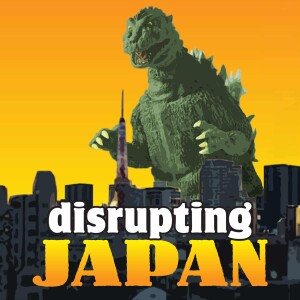
Disrupting Japan: Startups and Venture Capital in Japan
Business:Entrepreneurship

The way we get our food is changing.
Many are discussing how to make modern farming more sustainable, but this startup working to end it entirely.
Ikuo Hiraishi is a serial entrepreneur and the Japan head of Infarm Japan, an urban-farming startup growing food at supermarkets. In fact, as Ikuo explains, a lot more of your food is grown indoors than you probably imagine.
The future of food will look nothing like its past.
t's a great conversation, and I think you'll enjoy it.
Show Notes
What is Urban framing, and why do it?
Why Japanese consumer's first resisted urban farming
The true value proposition for the supermarkets.
The biggest costs in indoor farming are not what you think.
Why, after 40-years. urban farming is finally taking off in Japan
The two challenges to scaling indoor agriculture
Three reasons Japan might be the perfect market for urban farming and one reason it may not be
Why it's better to grow cheep veggies with expensive tech
Is it better to be a founder or a VC?
Links from the Founder
Everything you ever wanted to know about Infarm
METI visiting the Infarm Growing Center in Berlin
Follow Ikuo on Twitter @ikuoch
Friend him on Facebook
Check out Ikuo's article about the Japan startup & VC landscape
More about Ikuo
Ikuo's consulting company Dreamvision and blog
He's also a Professor at Entrepreneurship Department, Musashino University
... and an AsiaBerlin ambassador
Transcript
Welcome to Disrupting Japan, straight talk from Japan’s most successful entrepreneurs.
I’m Tim Romero and thanks for joining me.
Food is complicated.
That's why successful food related startups are so rare and so important when we do find them. Today, we sit down with an old friend after almost eight years. Ikuo Hiraishi is running Infarm Japan, an urban farming startup that is actually growing vegetables in supermarkets.
Now, indoor farming or hydroponics has been fairly common since the 1980s, but the combination of rising global cost of food and the plummeting cost of technology and some innovative machine learning has resulted in urban farming not only becoming commercially viable today, but providing a very interesting value proposition for the supermarkets. And a pretty interesting value proposition for you and me as well.
We talk about the future of food, why you need expensive technology to grow cheap vegetables, and whether it's better to be a founder or VC in today's world. But, you know, Ikuo tells that story much better than I can. So, let's get right to the interview.
Interview
Ikuo: Cheers. Very nice to see you.
Tim: I'm sitting here with Ikuo Hiraishi, a serial entrepreneur, angel investor, and new urban farmer.
Ikuo: Thank you.
Tim: So, thanks for sitting down with us.
Ikuo: It's honor to be back here, to have a chat with you.
Tim: It's been a while. It's been around eight years.
Ikuo: Yes. I was kind of like test interviewee of Disrupting Japan. That was eight years ago.
Tim: I think you were episode number four.
Ikuo: Yes. A very early episode.
Tim: Very early. And we're closing in on episode 200 now.
Ikuo: Oh, cool. Congrats.
Tim: But yeah, we're here to talk about urban farming. So, just so I can make sure I understand it correctly. So, the types of farming we have, like rural farming, which is just vegetables out in the field, like just farming.
Ikuo: Yes. Soiled based farming.
Tim: And then we have indoor farming, which is like plants and warehouses and things that are usually in the suburbs or in the outskirts of cities. And then we have what you and Infarm are doing, which is urban farming, where the veggies are grown like in the supermarkets themselves. So, what's the big advantage of urban farming overall, the other types of farming?
Ikuo: So, of course there are lots of advantages, but so we can minimize the food mileage meaning delivery distance. So,
view more
More Episodes
Brick-and-Mortar is Japan’s New E-Commerce
 2016-09-12
2016-09-12
 2016-09-12
2016-09-12
The Real Reason Uber is Failing in Japan
 2016-08-01
2016-08-01
 2016-08-01
2016-08-01
Crowdsourcing My Career
 2016-06-14
2016-06-14
 2016-06-14
2016-06-14
What’s Wrong With BioTech in Japan – Molcure
 2016-05-09
2016-05-09
 2016-05-09
2016-05-09
Japanese Startups, This Must Change Now!
 2016-03-14
2016-03-14
 2016-03-14
2016-03-14
012345678910111213141516171819
Create your
podcast in
minutes
- Full-featured podcast site
- Unlimited storage and bandwidth
- Comprehensive podcast stats
- Distribute to Apple Podcasts, Spotify, and more
- Make money with your podcast
It is Free
- Privacy Policy
- Cookie Policy
- Terms of Use
- Consent Preferences
- Copyright © 2015-2024 Podbean.com





